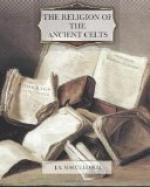[311] RC xii. 59.
[312] Folk-Lore Journal, v. 66; Rh[^y]s, HL 314.
[313] Larminie, “Kian, son of Kontje.”
[314] Joyce, OCR 37.
[315] D’Arbois, vi. 116, Les Celtes, 39, RC xii. 75, 101, 127, xvi. 77. Is the defaced inscription at Geitershof, Deo M ... Sam ... (Holder, ii. 1335), a dedication to Mercury Samildanach? An echo of Lug’s story is found in the Life of S. Herve, who found a devil in his monastery in the form of a man who said he was a good carpenter, mason, locksmith, etc., but who could not make the sign of the cross. Albert le Grand, Saints de la Bretagne, 49, RC vii. 231.
[316] Holder, s.v.; D’Arbois, Les Celtes, 44, RC vii. 400.
[317] Holder, s.v. “Lugus.”
[318] Stokes, TIG 103. Gaidoz contests the identification of the Lugoves and of Lug with Mercury, and to him the Lugoves are grouped divinities like the Matres (RC vi. 489).
[319] HL 425.
[320] See p. 349, infra.
[321] See p. 272, infra.
[322] HL 409.
[323] See Loth, RC x. 490.
[324] Leahy, i. 138, ii. 50, 52, LU 124_b_.
[325] LL 215_a_; see p. 78, supra.
[326] See, further, p. 385, infra.
[327] The Welsh People, 61. Professor Rh[^y]s admits that the theory of borrowing “cannot easily be proved.”
CHAPTER VI.
THE GODS OF THE BRYTHONS
Our knowledge of the gods of the Brythons, i.e. as far as Wales is concerned, is derived, apart from inscriptions, from the Mabinogion, which, though found in a fourteenth century MS., was composed much earlier, and contains elements from a remote past. Besides this, the Triads, probably of twelfth-century origin, the Taliesin, and other poems, though obscure and artificial, the work of many a “confused bard drivelling” (to cite the words of one of them), preserve echoes of the old mythology.[328] Some of the gods may lurk behind the personages of Geoffrey of Monmouth’s Historia Britonum and of the Arthurian cycle, though here great caution is required. The divinities have become heroes and heroines, kings and princesses, and if some of the episodes are based on ancient myths, they are treated in a romantic spirit. Other episodes are mere Maerchen formulae. Like the wreckage of some rich galleon, the debris of the old mythology has been used to construct a new fabric, and the old divinities have even less of the god-like traits of the personages of the Irish texts.




